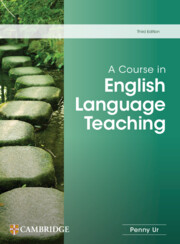Book contents
- Frontmatter
- Contents
- Acknowledgements
- Introduction
- 1 Teaching English today
- 2 The lesson
- 3 Classroom interaction
- 4 Tasks
- 5 Texts
- 6 Teaching vocabulary
- 7 Teaching grammar
- 8 Teaching listening
- 9 Teaching speaking
- 10 Teaching reading
- 11 Teaching writing
- 12 Feedback and error correction
- 13 Assessment and testing
- 14 The syllabus
- 15 Teaching/learning materials
- 16 Teaching content
- 17 Classroom discipline
- 18 Digital technology and online teaching
- 19 Learner differences 1: age
- 20 Learner differences 2: diversity and inclusion
- 21 Teacher development
- Glossary
- References
- Index
- Frontmatter
- Contents
- Acknowledgements
- Introduction
- 1 Teaching English today
- 2 The lesson
- 3 Classroom interaction
- 4 Tasks
- 5 Texts
- 6 Teaching vocabulary
- 7 Teaching grammar
- 8 Teaching listening
- 9 Teaching speaking
- 10 Teaching reading
- 11 Teaching writing
- 12 Feedback and error correction
- 13 Assessment and testing
- 14 The syllabus
- 15 Teaching/learning materials
- 16 Teaching content
- 17 Classroom discipline
- 18 Digital technology and online teaching
- 19 Learner differences 1: age
- 20 Learner differences 2: diversity and inclusion
- 21 Teacher development
- Glossary
- References
- Index
Summary
Different kinds of content
By content I mean the subject matter that texts or tasks engage with, as distinct from the target language features, such as grammar and vocabulary. Here are some samples:
• Zero or trivial content. Bland, fairly neutral characters and events; superficially interesting topics with no cultural or other information or connection with realworld issues: for example, sentences about a fictional ‘John and Mary’ doing everyday activities; descriptions of conventional families; trivial anecdotes.
• The students themselves. Exploration of students’ own experiences, knowledge, opinions and feelings: for example, activities that ask students to write about someone they know, or compare tastes in food and drink.
• The local environment. Treatment of institutions, people, places, events, etc. from the students’ own town, country or background: for example, Greek students might discuss places they would recommend that tourists should visit in Greece.
• Moral, educational, political or social issues. Presentation of topics showing different points of view, and encouraging students to express opinions: for example, an article describing a social confl ict, or a dilemma to which students suggest a solution.
• An academic subject. Topics based on other subjects on the school or university curriculum, such as science or history. In some cases, an entire school subject, or an entire university course, may be taught in English (for a more detailed discussion, see Section 3).
• Occupation-linked content. Subjects relevant to a particular area of employment: for example, business, tourism or medicine.
• The English-speaking countries. Discussion of institutions, etc. from countries where English is the predominant language. Materials might cover British or American history, culture and customs, famous people, etc.
• General knowledge. Information about any subject in the arts, sciences, history, current affairs and more; celebrities; natural phenomena; social and cultural topics.
• Literature. To some extent a part of culture, but important enough to be listed as a separate section: stories, novels, plays and poetry written in English or translated into it. See Section 4.
• The English language itself. Apart from explanations of the grammar or other features of the language, other topics may be included, such as the history and development of the English language, the etymology or morphology of words, other interesting linguistic phenomena.
- Type
- Chapter
- Information
- A Course in English Language Teaching , pp. 221 - 233Publisher: Cambridge University PressPrint publication year: 2024

